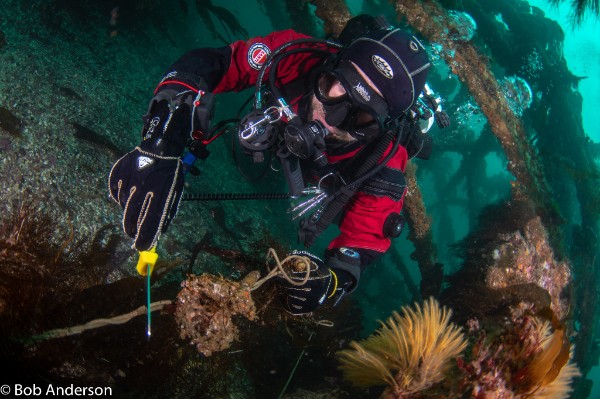
Ghost Fishing UK diver cutting rope in Orkney. Image: Bob Anderson
Working in partnership with World Animal Protection and marine scientists from Heriot Watt University, environmental diving organisation Ghost Fishing UK have successfully cleaned up seven main ships wrecks of Scapa Flow, Orkney.
After four expeditions over four years, and with a rapidly expanding team of instructors and trained volunteer divers, the remnants of the WWI German scuttled fleet are now safer and cleaner for divers and marine life alike.
Ghost gear – abandoned, lost or discarded fishing equipment is both a hazard to human life, marine life, and the environment – and with hundreds of thousands of tons of it in the oceans, it can live in waters for up to an estimated 600 years, snagging on rocks, ships wrecks, and even animals.
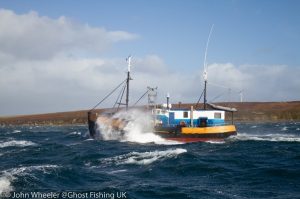 | 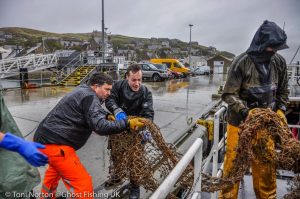 |
MV Halton ploughs through the waves. Image: John Wheeler | Divers on MV Valkyrie pull in ghost nets. Image: Toni Norton |
Scapa Flow is a natural harbour and was used for safe anchorage throughout both world wars. The German High Seas Fleet was interned in Scapa Flow during the armistice negotiations following the war. The entire fleet was scuttled on the orders of one man, Admiral Von Rueter when he failed to receive favourable news on the terms agreed in the armistice.
Today, seven main wrecks have survived the attentions of salvours and remain a significant draw for recreational divers every year. Ghost Fishing UK teams of divers, working from vessels MV Halton and MV Valkyrie, surveyed the wrecks of Scapa Flow, including the battleships Markgraf, Kronprinz Wilhelm and König, light cruisers Coln and Karlsruhe, and destroyer SMS V-83. Twenty-four divers, and six crew members including skippers Bob Anderson and Helen Hadley, spent six days working on the wrecks. Great piles of rope, twelve creel pots, queenie dredging nets, and whelk traps were all found on the famous dive sites.
In 2015 BigScapaCleanup teamed up with our Ghost Fishing UK for the first Scapa clear up, and for the last four years Ghost Fishing UK have returned, working with volunteers from around the country and the BigScapaCleanup initiative to continue the fight against marine litter.
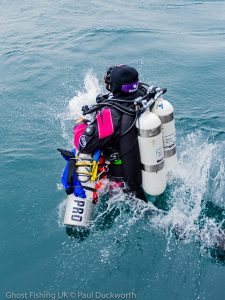 | 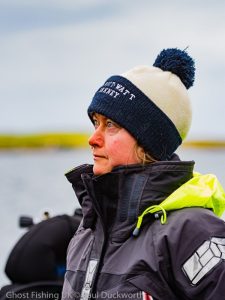 |
Gemma Thompson from ‘Girls That Scuba’ joined a 6 strong team of women in 2018. Image: Paul Duckworth | Dr Jo Porter from Heriot Watt University is key to managing Ghost Gear data. Image: Paul Duckworth |
The SeaCleanMachine reporting app in now fully active and allows for any diver visiting the ship wrecks of Scapa Flow, Orkney to use interactive maps to record the presence of marine litter of ghost gear which requires removal.
Together with the information collected by Ghost Fishing UK divers working with Heriot Watt University, and information collected through the Global Ghost Gear Initiative app created by World Animal Protection, this information will feed into a wider record so that scientists can evaluate the problem, and analyse its impact.
Using specialist equipment including Halcyon lift bags, Paralenz diving cameras, and underwater notepads designed by entrepreneur Gemma Thompson of Dive Proof, the teams were able to document what marine life was found entangled in ghost gear, and what was freed, and what was lifted to the surface. Along with the reams of rope, net, and line, litter including two lorry batteries was also removed from the wrecks.
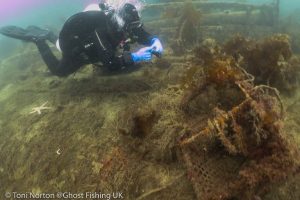 | 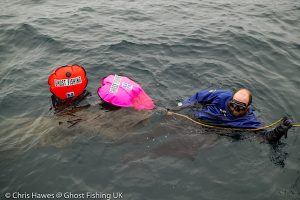 |
The Paralenz dive camera is a fantastic tool for surveying Ghost Gear, logging the whole dive profile and water temperature. Image: Toni Norton | Halcyon Dive Systems provide lift bags to the teams. They are labelled courtesy of DiveSigns. Image: Chris Hawes |
The week-long operation was divided into two main themes; the two dive boats spend six days scuba diving, surveying, and bringing to the surface ghost fishing equipment, whilst in tandem a full training programme of both new Ghost Fishing UK divers and instructors was ran. Five new divers were trained up, as well as five new instructors. The Ghost Fishing UK course is three days of learning and being assessed on basic safety skills, surveying of ghost gear and marine life, and how to safely use underwater lifting equipment to safely remove ghost gear.
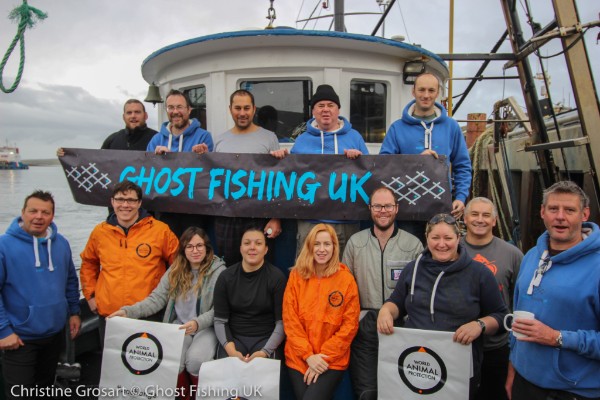
Representatives from World Animal Protection joined MV Halton to see what went on during the week long clean up.
Image: World Animal Protection
During the week the Ghost Fishing team and Heriot Watt University joined forces to give an evening of talks with the opportunity to ask questions via live feed at Stromness Town Hall. The evening proved a success, with over 80 people in attendance, and with more watching and putting questions to the panel via Facebook Live.
2019 marks the centenary of the scuttling of the German High Seas Fleet after World War One and ahead of next years’ centenary, Ghost Fishing UK have been able to make the wrecks of Scapa Flow both a safer and cleaner place for the marine life that inhabits them, and the many divers expected to flock to the Orkney next year.
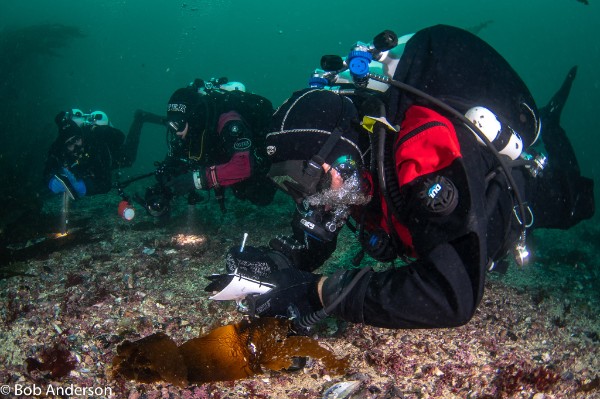
Peter Ellwood (trainer) Toni Norton (trainer intern) and Alana Dempsey (trainee) get ontop of the surveying aspect of the course by conducting a Seasearch survey. Image: Bob Anderson
The wrecks of Scapa Flow are of great significant historic interest and are specifically protected by legislation that prohibits tampering or disturbing of the sites. Permission was specifically granted by Historic Environment Scotland for Ghost Fishing UK to clear the wrecks of old abandoned, lost or discarded fishing equipment, and litter.
The permissions granted by Historic Environment Scotland highlight the value held in our maritime heritage. The four successfully ran operations truly reflect the growing importance of citizen science, and the democratic weight that volunteer programmes bring to the wider marine environment, be that ecological, historical or cultural.
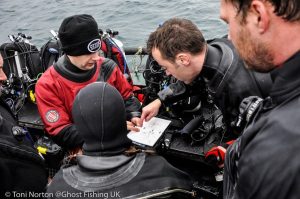 | 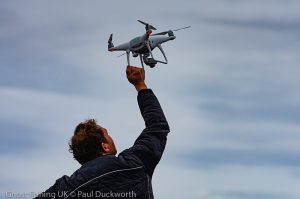 |
Fred Nunn coordinates survey data collection and dive planning on board MV Valkyrie. Image: Toni Norton | Scott Pendry catches John Wheeler’s drone. Image: Paul Duckworth |
Globally there is a lack of documented evidence on just how much the presence of ghost gear in the ocean affects wildlife and marine habitats, and so the work completed on Orkney with marine scientist Dr Jo Porter of Heriot Watt University is vital to conservation efforts. Dr Jo Porter is from the International Centre for Island Technology, Heriot Watt University (Orkney Campus). She says:
“The data that have been collated over the last four years will allow fisheries scientists to build a model to allow understanding of the component of the fishery which is lost due to ghost fishing. No fishers want to lose their gear, so by removing lost items from the wrecks and the marine habitat we are resolving the issues of lost catch, damage to wildlife, safety to divers and also the long-term legacy of plastics getting into the food chain as the items start to break down. This has to be a win win for all concerned.”
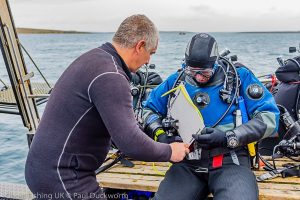 | 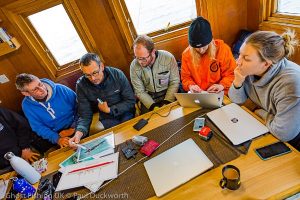 |
New Ghost Fishing trainee Jack Willans from London Aquarium is shown the ropes by trainer, Colin Stratton. Image: Paul Duckworth | Bob Anderson briefs the divers on the next dive site on board MV Halton. Image: Paul Duckworth |
Blue Planet II helped millions of people to see just how much mankind is polluting our oceans – devastating conservation efforts of both marine life and habitats. But it didn’t mention that at least 46 % of the plastic in the Great Pacific Garbage Patch is from discarded fishing nets [1], or that the United Nations Environment Programme (UNEP) and the Food and Agriculture Organization of the United Nations (FAO) conservatively estimate that some 640,000 tonnes of fishing gear are left in our oceans each year [2].
World Animal Protection have supported Ghost Fishing UK from the very outset and they had this to say:
“It is a massive achievement by Ghost Fishing UK to have cleared Scapa Flow of ghost gear and we are very proud to have supported their work since the start of this project. Ghost gear is by far the deadliest ocean plastic to marine animals because it is designed to catch and kill. Ghost Fishing UK is on the frontline of the global fight against this threat and projects like this show the positive impact we can have for wildlife and marine environments when we work together.”
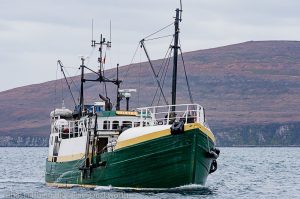 | 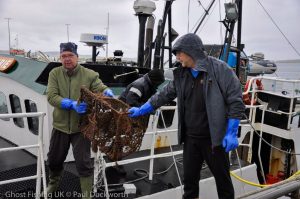 |
MV Valkyrie heads home from a day cleaning up Scapa Flow, skippered by Helen Hadley. Image: Paul Duckworth | Neil Bosher and Chris Hawes land the Ghost Gear catch of the day. Image: Paul Duckworth |
Ghost Fishing was set up to try to remove this lost equipment from the marine environment. It is a challenging and difficult task. Ghost Gear is typically entangled in reefs and wrecks, and its removal can be complicated. Removal involves a high degree of teamwork, coordination and discipline.
The problem of ghost fishing gear has very much grown within the public eye over the last five years. It is a normal part of fishing that nets, traps and other equipment becomes lost. This is often not a deliberate or careless act on behalf of the fishing industry, but simply the reality of a harsh environment. Modern fishing equipment is specifically designed to last in the sea – so it’s not going anywhere unless action is taken now.
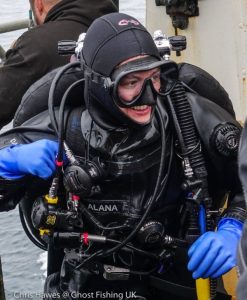 | 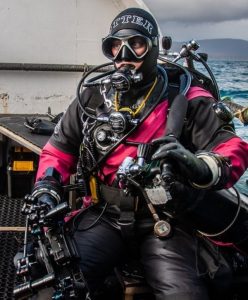 |
Ghost Fishing girls lead the way. New trainee Alana Dempsey (left) learns the ropes from Instructor Intern Toni Norton (right). Images Chris Hawes
Chairman of Ghost Fishing UK, Dr Richard Walker (Associate Professor in Citizen Science, Heriot Watt University) says, “The 2018 project has reached a significant milestone. We are delighted to announce that the scuttled WW1 high seas fleet are now clear of any actively fishing ghost gear. The health of the ocean has caught the public’s attention and the outlook often looks bleak. We hope that this is the first in a long line of positive improvements to the marine environment.”
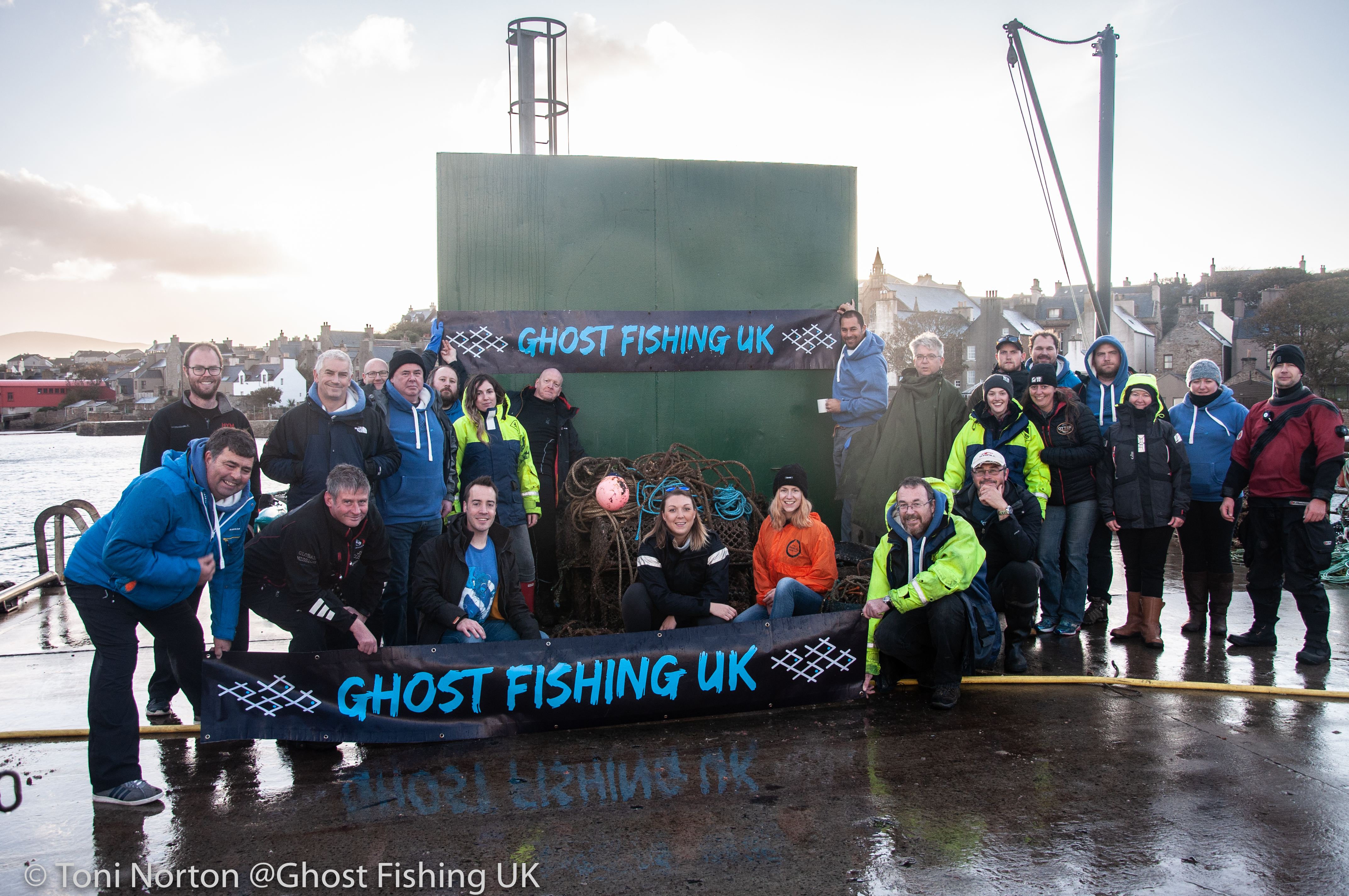
Ghost Fishing UK Scapa Flow class of 2018. Image: Toni Norton
[1] Evidence that the Great Pacific Garbage Patch is rapidly accumulating plastic, L. Lebreton et al, Scientific Reports, volume 8, Article number: 4666 (2018). [2] Abandoned, lost or otherwise discarded fishing gear, G. Macfadyen et al, United Nations Environment Programme and the Food and Agriculture Organization of the United Nations, Rome (2009).
Comments are closed.